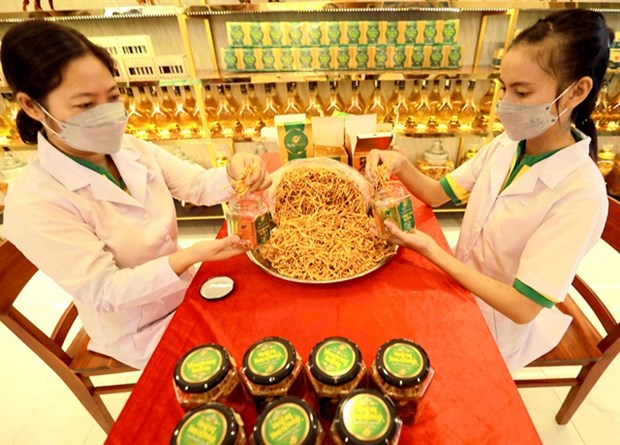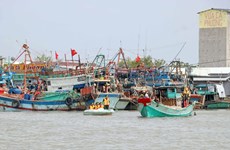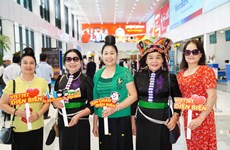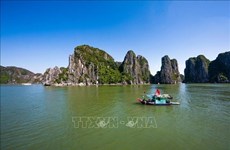Potential of tourism associated with OCOP products needs to be fully tapped
Industry experts have said there is still much-untapped potential for developing One Commune-One Product (OCOP) items associated with tourism activities in the Mekong Delta region.
 At a trade fair in Hanoi (Photo: VNA)
At a trade fair in Hanoi (Photo: VNA) They said the primary concern is to establish synchronised and coherent cooperation and solutions to simultaneously create sustainable livelihoods for local communities while enhancing product value and promoting tourism development.
Developing tourism associated with local specialities and OCOP products is an important solution to effectively develop tourism in the Mekong Delta region after the Prime Minister approved the OCOP programme for the 2021-2025 period and the rural tourism development programme for the 2021-2025 period.
With the certificated OCOP products, localities have initially implemented the effective development of tourism associated with OCOP products, combining the development of many types of tourism, such as cultural tourism, agricultural and rural tourism, ecotourism, and shopping tourism.
Currently, the country has over 8,800 OCOP products, focusing on six main product groups, including food and beverages, textiles and garments, souvenirs, decorations and interior furniture, herbs, and community tourism services and attractions.
In the Mekong Delta, which produces fruits, rice, and aquatic products with many traditional craft villages, many OCOP products have been recognised and supplied to the domestic and export markets.
The region has taken advantage of its natural conditions, agricultural production, culture, and craft villages to create unique tourist destinations.
OCOP products - a tourist destination
Ben Tre province, with three clusters of islets of Minh, Bao, and An Hoa, has been developing its tourism by promoting local specialities, specifically OCOP products.
Nguyen Thi Be Muoi, Vice Chairwoman of the provincial People's Committee, said nearly 160 products had been granted OCOP certification in Ben Tre province.
Visitors can participate in various activities, such as visiting production facilities, experiencing harvesting methods, processing raw materials, and tasting OCOP products associated with coconut trees. These activities create a unique attraction for local tourism in the province, she said.
Phan Thi Ngan from Nguyen Tat Thanh University stated that the university had organised a tour in which tourists can participate in some processing stages of coconut candy and rice paper.
Ca Mau, the country’s southernmost province, is a land rich in unique resources from saltwater and freshwater ecosystems, bringing many exotic products to the locals.
Tran Hieu Hung, director of the provincial Department of Culture, Sports and Tourism, said visitors could experience harvesting of forest products such as reeds, and many other unique OCOP products such as reed honey, salted ba khía fish, eco-friendly crabs, and shrimp chips. Tourists always express their enthusiasm for participating in these activities and trying the unique OCOP products.
In Soc Trang province, the promotion of OCOP products in tourist attractions has been carried out. Visitors can visit the agricultural production facilities and shop at the safe food stores after visiting the floating market in Nga Nam town.
The community-based tourism destination of Farmstay San Tien in Cu Lao Dung district brings special experiences such as cycling through the forest, hiking through the jungle, catching snails, clams and fishing, drinking honey coconut water, and enjoying grilled snail specialities.
Ca Mau province is currently constructing the Dat Mui Cultural Tourism Village, the tourism model associated with local OCOP products.
Vice Chairman of the People's Committee of Dat Mui commune said that the commune has gradually perfected traditional craft chains and formed craft villages serving tourism, such as dried fish, dried shrimp and fish sauce-making villages so that visitors can witness and immerse themselves in the most authentic and vivid production activities.
Untapped potential
Experts said that each OCOP product represents the culture of a specific locality and brings special features from its raw materials and production process, and embraces value in cultural and spiritual aspects.
They said many OCOP products have not become popular despite their high quality. Therefore, it is essential to fully exploit the values in OCOP products and introduce them to tourists, they said.
To link tourism with OCOP products, it is necessary to have cooperation among all authorities and sectors to preserve and convey the cultural values of OCOP products.
Nguyen Trung Khanh, General Director of the Vietnam National Administration of Tourism, said the administration would continue coordinating with the Ministry of Agriculture and Rural Development and localities to focus on upgrading and investing in developing rural tourism sites associated with OCOP products.
Tran Anh Thu, Vice Chairman of the An Giang Provincial People’s Committee, said the province would focus on policies to promote the development of OCOPs as well as planning and developing raw material areas in a bid to build distinctive and sustainable OCOP products.
An Giang is focusing on developing its strengths in local handicraft products, such as the Khmer traditional silk weaving village in Van Giao commune, the Cham traditional silk weaving village in Chau Phong commune, and the My A silk weaving village in Tan Chau town as well as ironwork products in Phu Tan district.
To create added value for OCOP products and tourism activities in Dong Thap province, Vice Chairman of the provincial People's Committee Doan Tan Buu said the province values the development of ecotourism and agricultural tourism associated with OCOP products, such as village craft tours and cultural tours.
The province is trying to attract investment to develop eco-tourism associated with the value chain of typical products such as lotus, mango, Lai Vung mandarin, and tra fish, he added./.













